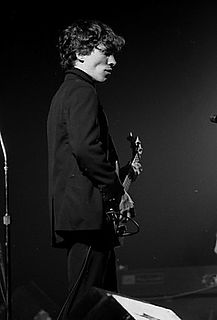A Quote by Alasdair MacIntyre
[M]odern society is indeed often, at least in surface appearance, nothing but a collection of strangers, each pursuing his or her own interests under minimal constraints.
Related Quotes
Each of us has interests which conflict the interests of everybody else... 'everybody else' we call 'society'. It's a powerful opponent and it always wins. Oh, here and there an individual prevails for a while and gets what he wants. Sometimes he storms the culture of a society and changes it to his own advantage. But society wins in the long run, for it has the advantage of numbers and of age.
If we fully trust that God is as beautiful as he reveals himself to be on the cross, we must regard the ugly surface appearance of these portraits to reflect the sinful way his people imagined God, not the way God actually is. But when we by faith look through the ugly surface of these portraits, we can see God stooping out of love to meet his people where they are at and to bear their sin, which is why in Scripture he takes on an ugly surface appearance that reflects the ugliness of their sin.
The rational herdsman concludes that the only sensible course for him to pursue is to add another animal to his herd. And another; and another . . . But this is the conclusion reached by each and every rational herdsman sharing a commons. Therein is the tragedy. Each man is locked into a system that compels him to increase his herd without limit — in a world that is limited. Ruin is the destination toward which all men rush, each pursuing his own best interest in a society that believes in the freedom of the commons. Freedom in a commons brings ruin to all.
If therefore my work is negative, irreligious, atheistic, let it be remembered that atheism — at least in the sense of this work — is the secret of religion itself; that religion itself, not indeed on the surface, but fundamentally, not in intention or according to its own supposition, but in its heart, in its essence, believes in nothing else than the truth and divinity of human nature.
The notion that the UN is some sort of dispassionate body that, “does right” and just pursues everybody’s best interests is a fantasy. Each individual nation will be pursuing their best interests. That’s the normal behavior of nation-states. It shouldn’t surprise us, but neither should we go to them for permission to do what’s in our national interests.
Racists violate the principle of equality by giving greater weight to the interests of members of their own race when there is a clash between their interests and the interests of those of another race. Sexists violate the principle of equality by favoring the interests of their own sex. Similarly, speciesists allow the interests of their own species to override the greater interests of members of other species. The pattern is identical in each case.
Every individual is continually exerting himself to find out the most advantageous employment for whatever capital he can command. It is his own advantage, indeed, and not that of the society which he has in view. But the study of his own advantage naturally, or rather necessarily, leads him to prefer that employment which is most advantageous to society... He intends only his own gain, and he is in this, as in many other cases, led by an invisible hand to promote an end which was not part of his intention








































